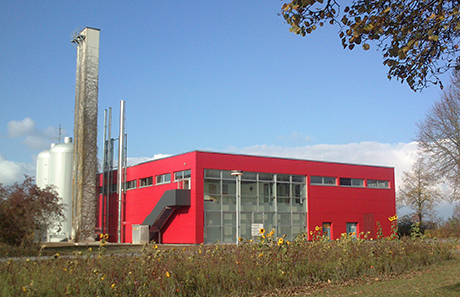
In a flagship project for the state of Baden-Württemberg, we created a cross-sector, hybrid energy infrastructure at the State Police Academy in Biberach that combined self-generated electricity and electricity price-based operation in the day-ahead energy market.
The new energy center operates at two different temperature levels. In the high temperature circuit (approx. 90°C), two CHP units (680 kWth, 405 kWel each), a power-to-heat system (405 kWth) and a gas boiler (1.75 MWth) feed power for peak load coverage. To provide the requisite flexibility in heat generation, two 100 m³ high-temperature storage tanks are equipped and allow for a temporal decoupling of CHP generated electricity and heat.
The low temperature circuit (approx. 35°C) is fed by the solar thermal system (400 m²). The previous heating oil tank, with a storage volume of 500 m³, now serves as a low-temperature storage tank. A heat pump (350 kWth, 80 kWel) is used to transfer energy from the low temperature circuit at the temperature (approx. 70°C) required to supply the high temperature circuit. The heat pump provides a flexible link between the two temperature circuits and is set to summer or winter operation for optimum efficiency.
Customer benefits
- Approx. 70% reduction in operating costs per year
- Primary energy use down by approx. 50%
- Intelligent timetable management: Self-generated electricity and electricity price-based operation allows for the economic optimum at any given time
- Fully automated, forecast-based generation and load management
- Two different temperature levels ensure maximum plant efficiency
- Temporal decoupling of heat generation and consumption by heat buffer storage
The article in the May/June 2016 issue of Stadt + Werk, explains in detail how surplus regeneratively generated electrical energy is stored cost-effectively as heat in Biberach.
Read the complete article here (German language only).